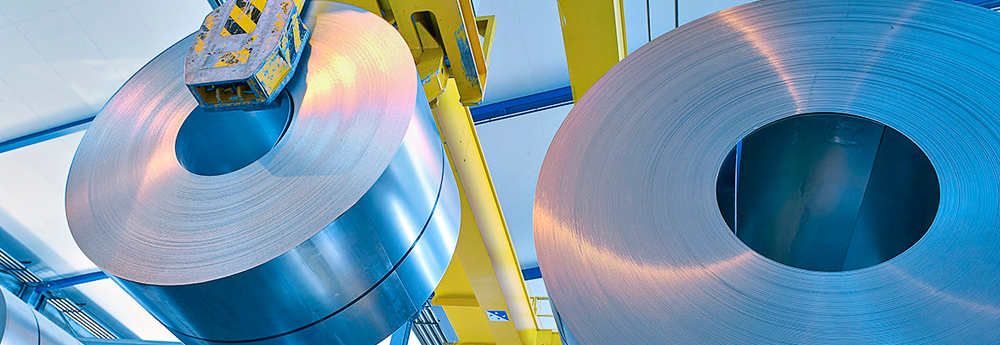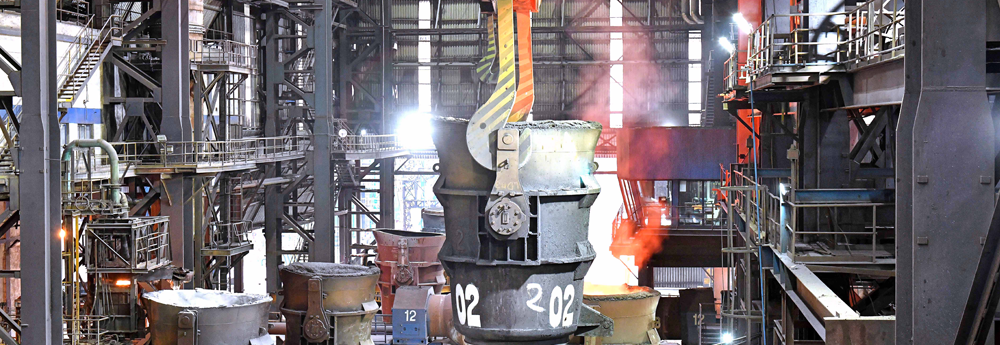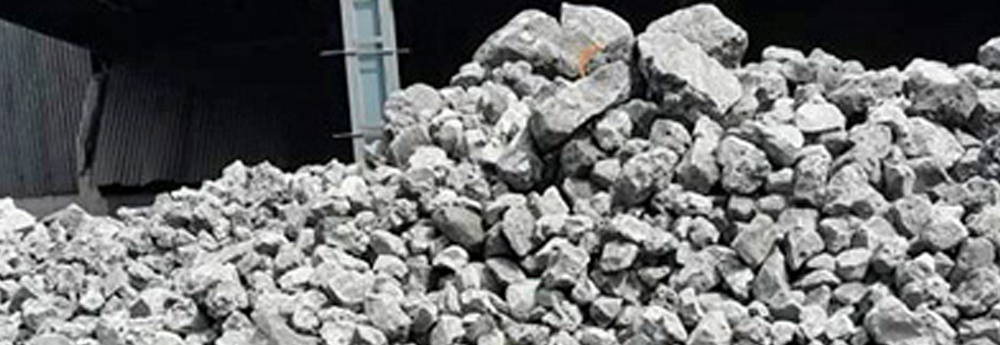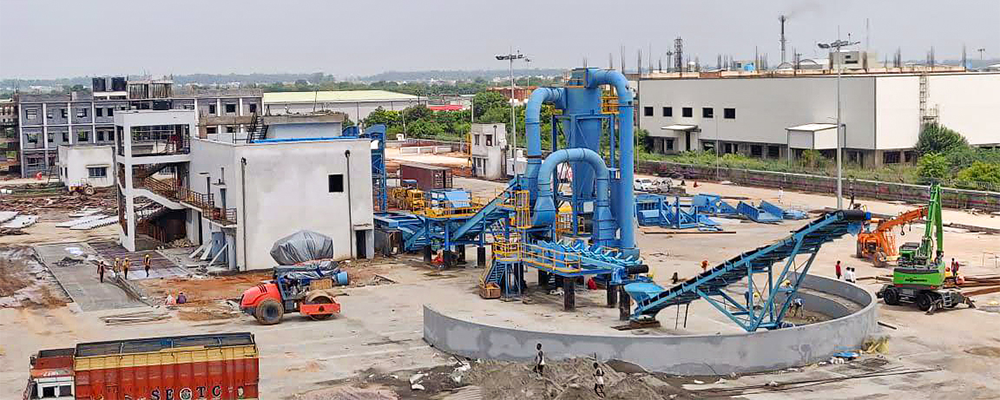 Manufactured capital
Manufactured capitalTata Steel continuously invests in improving the efficiency of its ironmaking, steelmaking and rolling facilities and warehouses, along with logistics, while ensuring the safety and reliability of its operations. We plan to augment our production capacity through a combination of organic and inorganic growth opportunities. Our steelmaking operations have secure raw material supply from captive iron ore mines, which contributes to our cost leadership.
Crude Steel Production
Deliveries
State-of-the-art Scrap Processing Plant setup at Rohtak
Impact on SDGs

Business growth
Long term Profitability
Product and service quality
Technology, product and process innovation
Efficient operations and value chain are critical to meet growth aspirations and address the evolving needs of customers
We continue to invest in facilities that enable us to be a leader in steel technology
The Jamshedpur plant is our flagship facility. Our continuous improvement efforts over the years have helped sustain production levels and deliver operational excellence.
Despite the pandemic-induced challenges, our crude steel production stood 9.34 MnT. We achieved the best ever Pulverised Coal Injection (PCI) rate, reduced waste generation, improved waste utilisation, and maximised energy and material efficiency. Our consistent focus on asset management using data analytics and predictive modelling resulted in more than 92% overall average plant availability of key manufacturing units at Jamshedpur.
Availability of critical manufacturing units at TSJ in FY 2020-21
|
Coke ovens |
>99% |
|
Agglomerates |
>90% |
|
Blast furnaces |
>91% |
|
Steel making |
>93% |
|
Rolling mills |
>88% |
 Good if decreases
Good if decreases

 TSJ
TSJ
 TSK
TSK

 TSJ
TSJ
 TSK
TSK
We undertook various initiatives to overcome pandemic-related restrictions.
We operated with about 40% workforce, POD system (for tracing of groups), thermal screening, travel history checking at gates, and maximising testing – while meeting production and maintenance requirements. With the lockdown easing in June 2020, the Kalinganagar facility started moving towards its rated capacity with critical KPIs such as fuel rate in blast furnace and hot metal and scrap in Steel Melting Shops witnessing improvements. In-house power generation, which includes captive power plant, and Coke Dry Quenching power also reached the best ever generation, reducing dependence on purchased power. TSK got certified for the EHSMS Management Systems - ISO 45001:2018 and ISO 14001:2015 in FY 2020-21.
The Kalinganagar Plant has embarked on its second phase of expansion which will ramp up production capacity to 8 MnTPA. The construction of Pellet Plant and Cold Rolling Mill (CRM) aimed at supporting the agglomerate mix for the blast furnace and catering to high-strength cold-rolled products gained momentum during the year. These projects along with augmentation of raw material handling facilities are expected to be commissioned in FY 2021-22.
Tata Steel is one of India’s most integrated steel companies with captive mines of iron ore and coal supplying to its manufacturing facilities. The highest standards of environment management are followed in mining locations while using the best available technologies.
We produce steel through the conventional blast furnace route. Raw materials are converted to hot metal and crude steel through various processes including coke making, sinter making and pelletisation. The processes are designed to deliver high productivity with the available resources while managing slag rate and steelmaking requirements.
The rolling mills help in manufacturing a diverse product mix with customised shapes, sizes, and various chemical and technical properties. Aligned with customer specifications and requirements, these products undergo stringent quality checks and assurance processes. We also produce a range of valueadded products for the retail markets and provide customised solutions to industrial buyers.
As an initiative to be future-ready and establish the supply chain for scrap, we had set up our Steel Recycling Business in FY 2018-19. The first steel scrap processing unit was commissioned at Rohtak in Haryana, with an initial capacity of 0.5 MnTPA in FY 2020-21. With the first unit templatised, we plan to replicate such modular units across India.
Tata Steel has a long-integrated value chain that extends from mining to finished steel products with an interconnected network of suppliers, mines, ports, manufacturing locations, stockyards, processing facilities, channel partners and customers.
The organic and inorganic expansion over the years has added to the complexity of multi-location operations. Tata Steel’s Supply Chain Management handles planning, sourcing, delivery and logistics of ~100 MnT materials which includes raw materials, finished goods and by-products. With the integration of Supply Chain functions into ‘One Supply Chain’, there is an increased focus on end-to-end margin management in raw materials and finished goods through synergies between hubs. VIU (Value-In-Use) based cost models have been built for the distribution of raw materials (coal-coke and metallics) across sites for achieving global optima. Similar work is in progress for products leveraging integrated IT solutions and differentiated customer delivery strategy. During the year under review, several initiatives were taken up to make our Supply Chain future-ready and sustainable through infrastructure investments, technological excellence and engagement with supply chain partners for deployment of Responsible Supply Chain Policy.
Outbound logistics is about 60% dependent on railways and 40% on roadways at various locations. It consists of a network of warehouses and Steel Processing Centres (SPCs), ensuring timely delivery and transportation of finished products to meet on-time delivery expectations of customers. This is enabled by a network of hubs and stockyards at strategic locations across India to ensure delivery cycles are as low as 48 hours from stockyards.
Our Industrial By-products Management Division (IBMD) manages a variety of by-products and scrap generated across the entire steel value chain and has adopted circular economy principles as an integral part of its business values.
A dedicated Marketing & Sales organisation for by-products focusses on expanding profitability through marketing initiatives and downstream value enhancement of byproducts.
In FY 2020-21, the accelerated weathering facility for LD slag has enabled significant ramp-up of the utilisation of processed slag in construction of national highways. A new by-product value-creation centre with modern processing equipment has been commissioned at Tata Steel Jamshedpur to facilitate higher scrap consumption at LD shops for reducing GHG emissions.

Facilities/Equipment
Iron ore, coal, chrome and manganese ore mines
Iron ore, coal, chrome and manganese ore mines
Beneficiation plant
Logistics and handling facilities

Facilities/Equipment
Flat and long products mills
Wire rods/drawing facilities
Tube-making facility
Slab to coil facility
Billet to bar/rod facility
Rolling Tandem Mill for pickling and rolling
Hot dip galvanising facility

Facilities/Equipment
Bell-less top charge high-capacity blast furnaces
Basic oxygen furnace for steelmaking
Coke, sinter and pelletising plants
Raw material handling facilities
Online granulation of blast furnace slag
Stamp charging battery
Coke Dry Quenching (CDQ)
Desulphurisation facility
Secondary steelmaking

Facilities/Equipment
Metal recovery plant
Slag processing plant


Improve availability and utilisation of plants to best-in-class levels
Scale up Steel Recycling Business
Completion of Cold Rolling Mill complex and Pellet Plant at Tata Steel Kalinganagar